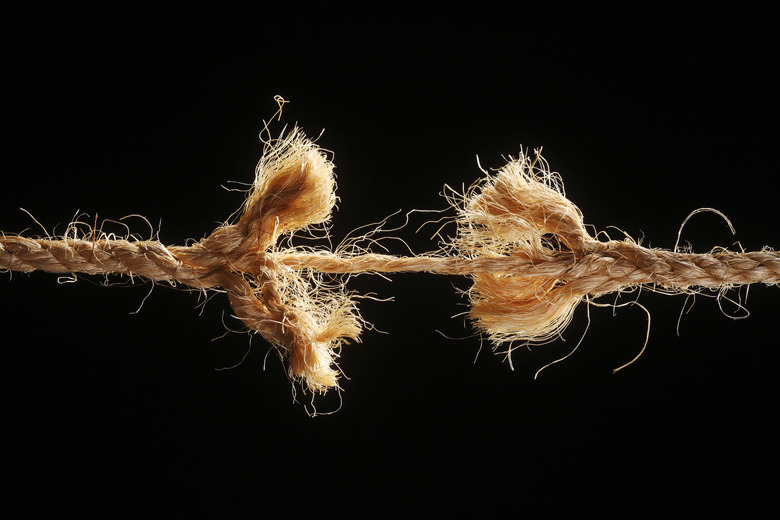How To Convert Rockwell Hardness To Tensile Strength
Hardness is a primary concern when deciding which building materials to use for construction. Performing hardness testing can take many forms, depending on the protocols followed. There are many hardness scales and one of the most common is the Rockwell scale. To convert Rockwell Hardness to Tensile Strength, use a polynomial equation developed by modeling the tested materials. The general formula is: TS = c3 * RH^3 + c2 * RH^2 + c1 * RH + c0. "RH" stands for the "Rockwell Hardness" in the formula, and "TS" represents "Tensile Strength."
Step 1
Determine which Rockwell Hardness scale yielded the hardness value. The hardness scales range from A through V. For an example of the conversion process in this article, assume that the Rockwell Hardness scale B is used.
Step 2
Apply the formula for Tensile Strength obtained from the Rockwell hardness number, TS = c3 * RH^3 + c2 * RH^2 + c1 * RH + c0. The coefficients c3, c2, c1 and c0 are for scale B as 0.0006, -0.1216, 9.3502 and -191.89, respectively. Continuing the example, assume the material yielded a Rockwell hardness number of 100.
Step 3
Solve the Tensile Strength formula by inserting the Rockwell hardness number. Continuing the example, TS = 0.0006 * RH^3 – 0.1216 * RH^2 + 9.3502 * RH – 191.89 = 0.0006 * (100)^3 – 0.1216 * (100)^2 + 9.3502 * (100) – 191.89 = 600 – 1216 + 935.02 – 191.89 = 127.13. Round the Tensile Strength number to the closest whole number, so the Tensile Strength is 127 ksi.
Step 4
Convert the units of the Tensile Strength to psi using the fact that 1 ksi equals 1000 psi. Multiply the Tensile Strength number by 1000. Finishing the example, the Tensile Strength is 127,000 psi.
Things Needed
- Rockwell hardness value for material
- Calculator
TL;DR (Too Long; Didn't Read)
Use the calculated values as estimates only. The measured numbers are the ones that count. In the final analysis, only the results of the actual testing are reliable.
Cite This Article
MLA
Lancaster, Sean. "How To Convert Rockwell Hardness To Tensile Strength" sciencing.com, https://www.sciencing.com/convert-rockwell-hardness-tensile-strength-8759475/. 13 March 2018.
APA
Lancaster, Sean. (2018, March 13). How To Convert Rockwell Hardness To Tensile Strength. sciencing.com. Retrieved from https://www.sciencing.com/convert-rockwell-hardness-tensile-strength-8759475/
Chicago
Lancaster, Sean. How To Convert Rockwell Hardness To Tensile Strength last modified March 24, 2022. https://www.sciencing.com/convert-rockwell-hardness-tensile-strength-8759475/
